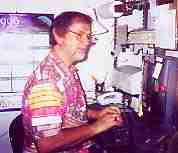Why Should We Ever Have A Broken Heart?
by Dr. Carl Weisbrod
|
by Dr. Carl Weisbrod |
|
From the "Book Of Esoteric Whys" Any experienced psychologist or psychiatrist can remove the pain of a broken heart in a session or two. It's simply a matter of knowing the correct approach to take. The broken-heart syndrome is relatively easy to |
 Dr. Carl Weisbrod |
diagnose and victims of this incredibly painful symptom tend
to follow a predictable thought process. In shrink talk, it's called
cognitional errors.
Unfortunately, with overhead costs, liability insurance, and salaries for
the staff, the cost will probably be in excess of $100, and that's even with
a medical plan. Without insurance... you probably don't want to know how
much it's going to cost!
The good news? You don't need to go to a high overhead clinic when your only
wish is to have the pain go away.
By using an eBook, a cassette recording, and a workbook, the same thing can
be done at a fraction of the usual cost.
Well, writers of country music say that they can't write good tear-jerker
lyrics until they have experienced at least one broken heart. On a more
practical note, the broken heart is probably necessary for emotional growth
not unlike physical learning process as, for example, a child touches the
hot stove. At the very least the broken heart teaches us to be careful how
we invest our emotional energy.
A patient once said to me: "I never signed up for this class!"
Here are the features of a broken-heart: There are feelings of rejection and
great loss. The problem is reactive, and that means the pain is a reaction
to something; in this case a strong blow to the person's emotional
stability. The problem is subjective, meaning that even though there is
another person involved, the real pain is from over-reactive thoughts that
have little direct relationship to the other person. The thoughts take on a
cyclic/depressive pattern that become obsessive. Salient features are
agitation, suicidal thoughts,
depression, pessimism, loss of efficiency, sleep problem , poor judgment,
and anger.
Scientific types have egos that makes it difficult to learn from each others
disciplines. Nevertheless, I've been forced to look away from the research
of the behavioral scientist to find answers to perplexing problems.
If you've read the first chapter of this eBook on weight control, you will
see that I found a solution withing the realm of the archeologist, et al.,
rather than the behavior scientist or the nutritionist.
The conflict the broken hearted experience is, of course, the inability to
let go, even when logic tells them that to stay hooked in will bring only
pain and misery. Why is this so? Strangely enough, a conflict like this is
better understood by the physicist rather than a psychologist.
Physics is the science that deals with the laws of matter and energy. These
laws tell us that matter isn't really solid-at least not like you and I
think of solid.
The building block of all matter, the atom, is mostly space. If the nucleus
of an atom was the size of a basketball and the placed on the fifty yard
line of a football field, the closest speck of matter, the electron, would
be out somewhere in the bleachers.
Atoms make up elements, which become molecules and compounds that make
up every speck of matter that exists.
So you see, everything is mostly space!
That which makes it seem solid is the energy bond that glues the entire
universe together. If you unglue just a couple of pounds of atoms you can
get one hell of an explosion that will (and sadly has) leveled entire
cities.
Are you still with me? The point I want you to get from this is energy is
more critical than anything you could break a tooth on.
I'll stop the physics lesson now if you can accept the importance of
energy-so back to psychology.
The human thought processes takes the form of negative and positive energy.
Positive energy is usually constructive; negative energy is often (but not
always) destructive.
There is an energy investment in thought the same way that there is a money
investment in a purchase. In both thought and purchases we may invest well
but just as often we may invest poorly.
When investing in cognition (thought) here is a rule: The more cognitive
energy you invest, the more you "own" the thoughts in which you are
investing.
As in physics, when the atomic weight increases, matter will progress from a
gas, to a liquid, and then to a solid. As a body of thoughts become
increasingly "solid," it can become very difficult to let it go-and it
doesn't make one bit of difference if it's negative or positive thought.
Such dichotomies such as love and hate, joy and sorrow, can have equal power
in our minds.
Once someone has invested great energy into something, that person will
attempt to justify the value-no matter how negative or destructive it is.
I hope you can see how it's possible to get sucked in to some pretty
horrible situations, and then attempt to convince yourself (and everybody
else) that it's justifiable behavior. The more you dump your precious mental
energy into a bottomless pit of a destructive relationship, the more hooked
in you can get.
~ ~ ~
Reference: How To Get Over A Broken Heart (an eBook, audio
tape, and
workbook program).
http://www.WDSlibrary.com
Listen to my latest Podcast:
http://www.wdslibrary.com/PodcastIndex.html
mailto:Carl@WDSlibrary.zzn.com
| Home |